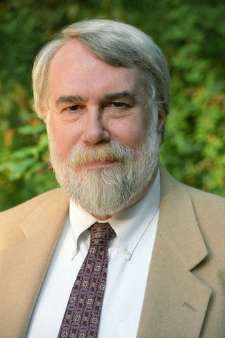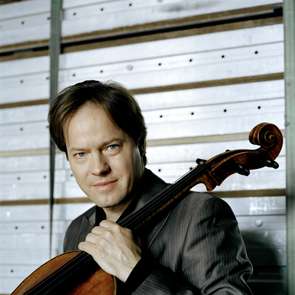|
Back
The Alchemy of Music New York
Avery Fisher Hall, Lincoln Center
02/21/2013 - & February 22, 2013
Christopher Rouse: Phantasmata
Ernest Bloch: Schelomo
Johannes Brahms: Symphony No. 1 in C Minor, Opus 68
Jan Vogler (Cello)
New York Philharmonic Orchestra, Alan Gilbert (Conductor) 
C. Rouse (© Jeffrey Herman)
That crazy Swiss alchemist Paracelsus deserved a musical gold-maker like Christopher Rouse. The 14th Century “physician” supposedly kept the devil in his basement. Mr. Rouse, the New York Philharmonic’s composer-in-residence, took the devil and placed it on the stage of Avery Fisher Hall last night with a work, based on a Paraclesian title (Phantasmata means “hallucinations through thought”) and the eccentric architecture of Antonio Gaudi.
The result was a demonically fascinating three-movement, 18-minute work which didn’t waste one second without an alchemy of sounds. These, though, were, not created through magic, but through the most judicious use of thirty percussion instruments, as well as crystal goblets, baritone saxophone, and the full Philharmonic.
Such a description implies a cacophonic bonanza of a piece. But Mr. Rouse, echoing his mentor and teacher, George Crumb, knows exactly where to put these sounds, so they individually provided a pointillistic palette of rings, dings, dongs and tintinnabulations for which Paraclesus himself would have sold his soul to the Prince of Darkness.
In other words, Christopher Rouse has once again showed that he is amongst the most original and bewitching composers today. The first movement of Phantasmata, “The Evestrum of Juan de la Cruz in the Sagrada Familia 3 a.m.”, was Mr. Rouse at his most mystical, string chords at different intervals, signaling a journey of dreams, through Gaudi’s great cathedral and Paraclesus’s “evestrum”, an astral body.
The next movement, “Infernal Machine” needed no description. The orchestra was an assemblage, but the percussion were all individual, lightning scales played with fractional sounds by single vibraslap, metal plate, crystal glasses, hammer, thunder sheet etc. etc, created dazzling colors, tingling joys. How only five percussionists handled it all demonstrated that in this case, conductor Alan Gilbert was quite the alchemist himself.
The final movement, “Bump” was jazzy, bumpy, brassy (one combination of brass which sounded like the call of a werewolf) and a predictable but still exciting finale.
After this circus of delights, one expected Ernest Bloch’s Shelomo to sound like Shelo Motion. Yet, I had underestimated Mr. Bloch. Despite the title, his music was anything but (in Constant Lambert’s phrase from Music Ho!), “lugubrious Jewish music” (Still a remarkable book despite its blatant anti-Semitism.) In fact, Bloch, a secular Swiss Jew who spoke no Hebrew, took his inspiration from the Book of Ecclesiastes, that nihilistic philosophy of pure Schopenhaueristic hopelessness.

J. Vogler (© Mat Hennek)
Ernest Bloch is rarely played these days (though his America Symphony was given a rambunctious reading a few years ago). He was an impressionist, but also a romantic, and rare is the performer who can reach both levels. German cellist Jan Vogler gave it all the verve needed, so that even those sections veering on the maudlin had an energy.
I’m certain he didn’t mean it, but as Mr. Vogler rocked back and forth in his playing, he actually did resemble those old Jewish male congregations for whom “rock ‘n read” was part of the ritual. It added nothing to the music, but Mr. Bloch would have been amused.
After the intermission, Alan Gilbert returned from his rare opening works to play a Brahms First that was brisk, lively, with no-nonsense tempos. Brahms was not one to put up with affectations of any sort, and this music was unaffected, driven only by Mr. Gilbert and some terrific Phil playing.
Harry Rolnick
|